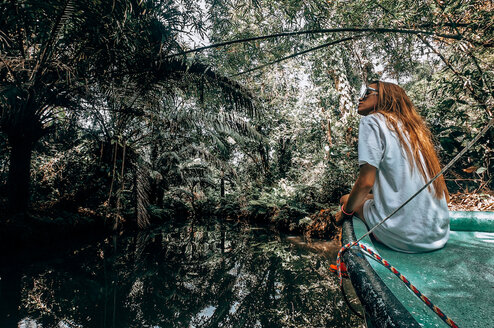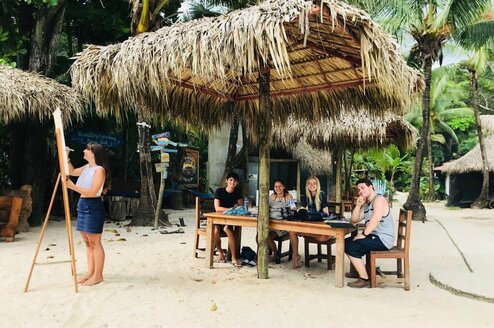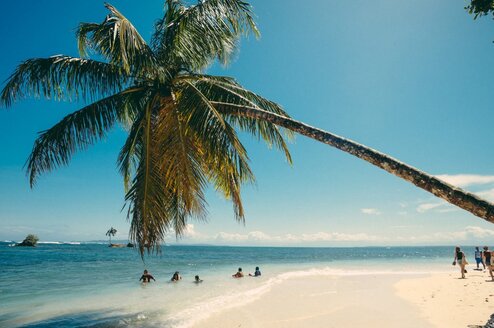Spanish Language Schools in Panama
About
For those who like the road a little less traveled, who are ready to be immersed in Spanish language and culture, and who get along well with nature: Panama may very well be the place for you.
There are language programs for all ages and levels of Spanish experience. You can enroll directly at one of Panama's many Spanish language schools or you can pursue courses in a college or university. You'll find programs ranging in length from one week to one year or more.
There's so much to explore outside the classroom too. Practice your Spanish while hiking, cave exploring, horse back riding, rock climbing, surfing, or dancing. Calling all Spanish lovers, animal lovers, and environmentalists. Vámonos!
Course Types
When deciding which course to pursue in Panama, it will help to think about how you want to use your new Spanish speaking skills. There are courses for general improvement, crash courses that are useful for tourist purposes, business Spanish, and more.
Unless you've already arranged accommodation and know where you want to study, it's a good idea to seek advice from people who have experience in organizing language trips to Panama.
If you're already in school in the United States, you can talk to teachers and staff about programs that might already be in place. Otherwise, there are many third party providers for international travel and language schools based in Panama that are well-equipped to find the Spanish language course that best suits your needs.
Spanish Language Schools
One common way to learn Spanish in Panama is by going through a third party provider. The purpose of these organizations is to plan your trip down to the last detail so you can focus on learning, exploring, and having that life-changing experience everyone's talking about.
There are many independent Spanish language schools (not associated with any university or college) in each of Panama's major cities. Some third party providers have agreements with several schools, while some schools have a staff that is prepared to do everything a provider would do.
You'll find programs that range in length from one week to one year, and welcome students of all ages. Some programs will be focused entirely on studying, while others offer more of a 2-for-1 experience. There are options for combining in-class training with volunteering, surfing, conservation projects, yoga, and more.
Universities and Colleges
Some language learning providers will be able to place you in universities or colleges in Panama. This is a good option if you're hoping the college credit will transfer back to your home institution. However, these opportunities are somewhat rare in Panama.
It's possible that your home university or college has a partnership, or exchange program, with a university in Panama. Exchanges are a great way to study abroad because they are relatively inexpensive, highly immersive, and help you progress toward your degree.
There are a few colleges in the United States that even have their own branch in Panama making it very easy for students to spend time there. By studying abroad at a branch campus, you can generally use any federal funding and/or scholarships the same way you would for your home college and credit is automatically counted toward your degree.
Planning Your Trip
Housing
Accommodation in Panama can range from having a room with a host family to renting a resort condo with a beach view and high speed internet. Where you choose to live depends heavily on what you hope to get from the experience.
Staying with a host family will provide frequent opportunities to put your Spanish language skills to the test. Some host families will only speak Spanish, but they will be very willing to help you practice. Start simple with conversations about food and weather, and if you keep it up, it gets much easier and more fun too!
If the idea of living with perfect strangers is just a bit too daunting, but you still hope for daily interactions with Spanish-speakers, you might choose to stay in a budget hotel or condo. If you opt for a less expensive option, you can always treat yourself to a weekend getaway at a resort hotel or condo. There are plenty to choose from!
If you aren't staying in a place that allows you to communicate in Spanish on a daily basis, you can check with the faculty and staff at your school in Panama for additional opportunities. They will probably recommend language meet-ups or community groups in your area. This is a great way to make lasting friendships.
Additional Tips
- If you are going to be in Panama for 180 days or fewer, and you are a United States citizen, you will not need a student visa. Any amount of time longer than that, and you'll need to apply for a student visa.
- The water in Boquette and Panama City is safe to drink, but you should drink bottled water in Bocas del Toro.
- When deciding where to study, ask if the school is accredited by Cervantes Institute. This one indicator of a good quality program.
For more information on specific locations and culture, we have an article on Studying Abroad in Panama.
Costs & Funding
If you decide to learn Spanish in Panama through a third party provider, you will likely see the cost in one lump sum. This will include tuition, accommodation, and usually airfare as well. It might not include excursions, meals, and in-country transportation.
A shorter stay means you will pay less. One week might be $2500 for an (almost) all-inclusive trip. However, you will get more out of your money with a longer stay. One summer could be around $7500, one semester would cost approximately $11,000, and a year is closer to $15,000.
Tuition Costs
There are many variables when considering the cost of Spanish language classes. At an independent school, weekly lessons could cost anywhere from $150 to $400. You can probably find cheaper classes, but the quality of the instruction might be the reason for that reduced price.
Another variable to consider is the number of students that are enrolled. Private lessons will be much more intensive and cost a good bit more. Small groups are the most common as they are a bit cheaper while still providing individual attention.
Cost of Living
Where you stay is possibly just as important as where you study. There are so many factors to consider, including safety of the area, language barriers, distance to the school, dietary restrictions, etc. That's why it's extremely helpful to have someone help you organize this aspect of your time abroad.
When choosing your third party provider, look for organizations that will take the time to match you with a suitable host family. The cost of staying with a host family varies but you can expect to pay at least $175 per week. Budget hotels will be in a similar price range. High season (summer) rates are higher than low season.
Other costs can range widely but include public transportation, meals, and souvenirs. If you eat every meal out, you could spend between $12 and $30 dollars per day. Of course, cooking your own meals will be significantly cheaper.












